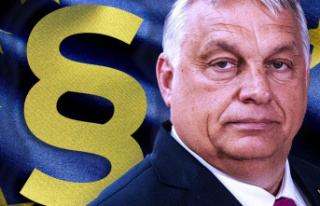After two years of restrictions due to the corona pandemic, a large party parade for Christopher Street Day (CSD) moved through the city on Saturday in Berlin.
The colorful procession started at noon, and the organizers were expecting up to 500,000 participants over the course of the day. The spectacle began with a rally and a shower of confetti on the Spittelmarkt in the Mitte district.
The subsequent demonstration with almost 100 vehicles, loud house, disco and electro beats and many imaginatively dressed pedestrians led on a 7.4 kilometer route through several Berlin districts to the Brandenburg Gate. A final party with a stage program was planned there until late in the evening.
The Berlin CSD is one of the largest events of the lesbian, gay, bisexual, transgender, intersex and queer community in Europe.
On the one hand, the participants take action against violence and discrimination. On the other hand, they wanted to have a mega summer party and just have fun. This was also expressed in the motto of the demonstration: It read "United in love. Against Hate, War and Discrimination”.
According to the organizers, 96 vehicles and at least 80 foot groups from all over the world took part in the demonstration – more than ever before at the CSD in Berlin, which was now in its 44th edition. Among them were people from the Ukraine, which has had to resist a Russian war of aggression for five months. A truck was assigned to this group.
Many participants dressed up for the mega party: whether it was expansive feather costumes in pink, glittering pants, golden skirts, black leather outfits with a mask or just light summer clothes – whatever you liked was allowed. A few almost naked women also joined the hustle and bustle, while other participants attracted attention with their hair dyed blue or pink. Thousands of cheering spectators lined the route, and people waved rainbow flags from buildings along the train.
The trucks spread music, confetti rain or artificial fog, sometimes bobbing to the beat as their passengers danced on the loading area. Among the vehicles was an old omnibus with the windows removed and decorated from top to bottom with red and pink balloons.
But it was also about political messages. At the opening, Berlin's Senator for Culture, Klaus Lederer, recalled the Russian war against Ukraine. "Thousands of people have fled, including many queer people." In Germany, people from the community are discriminated against, complained the left-wing politician, who is openly gay himself. The fight against this and for equality must go on. "We have to emancipate ourselves."
A novelty in Berlin: On the occasion of the 44th edition of the CSD, three rainbow flags waved for the first time at and on the Reichstag building, the seat of the Bundestag. The Chancellor's Office and other institutions such as the Federal Ministry of the Interior or the Federal Ministry of Defense also set an example for diversity and tolerance with the flag, the Bundesrat had also announced this. Only in April did the Ministry of the Interior officially grant permission for the symbol to be hoisted in front of or on federal official buildings on certain occasions.
Christopher Street Day is celebrated worldwide. The movement dates back to events in June 1969, when New York police officers stormed a bar on Christopher Street, sparking a riot by gay, lesbian and trans people.
In the last two Corona years, the CSD in Berlin only took place to a limited extent. The parade was officially canceled in 2020, but a few thousand people still took to the streets at an alternative event. In 2021, tens of thousands demonstrated at a slimmed-down CSD parade under strict corona conditions, and there was also a ban on alcohol.












